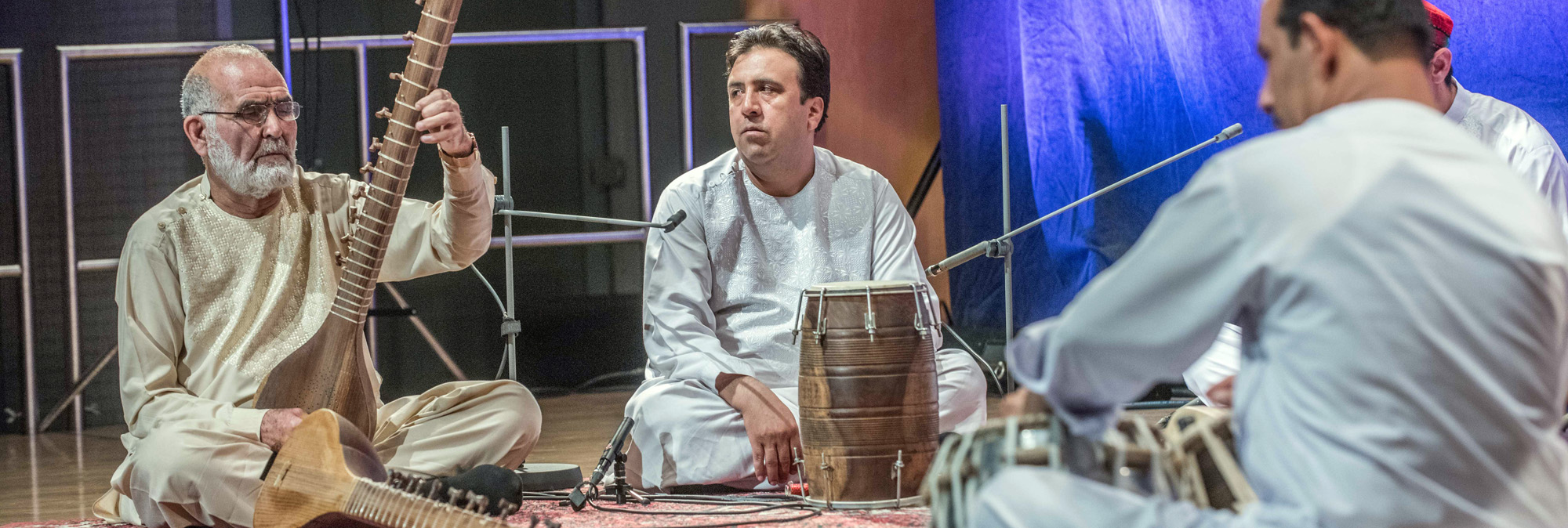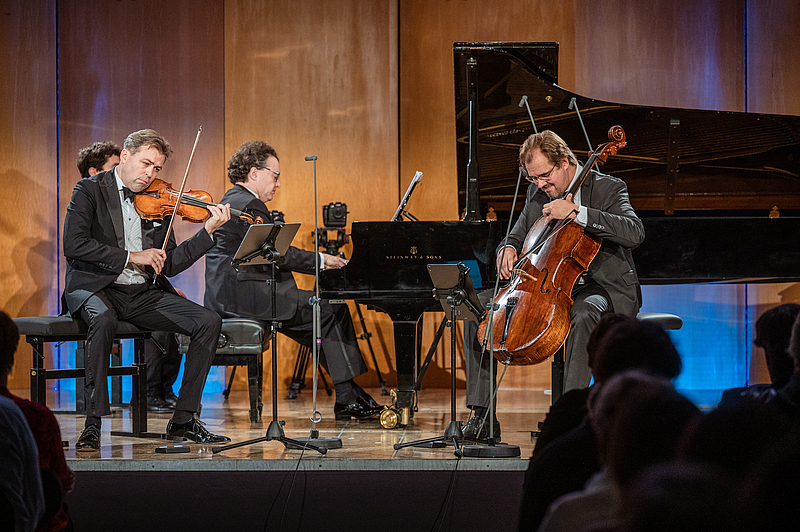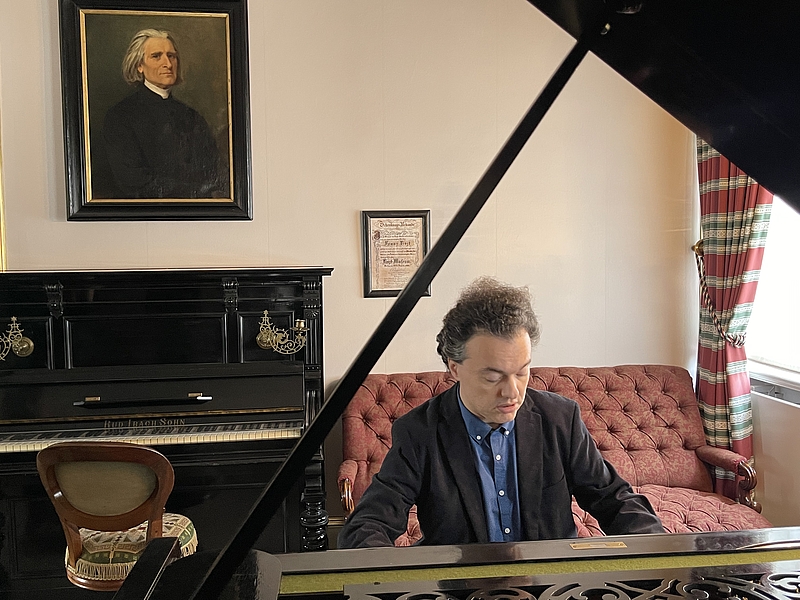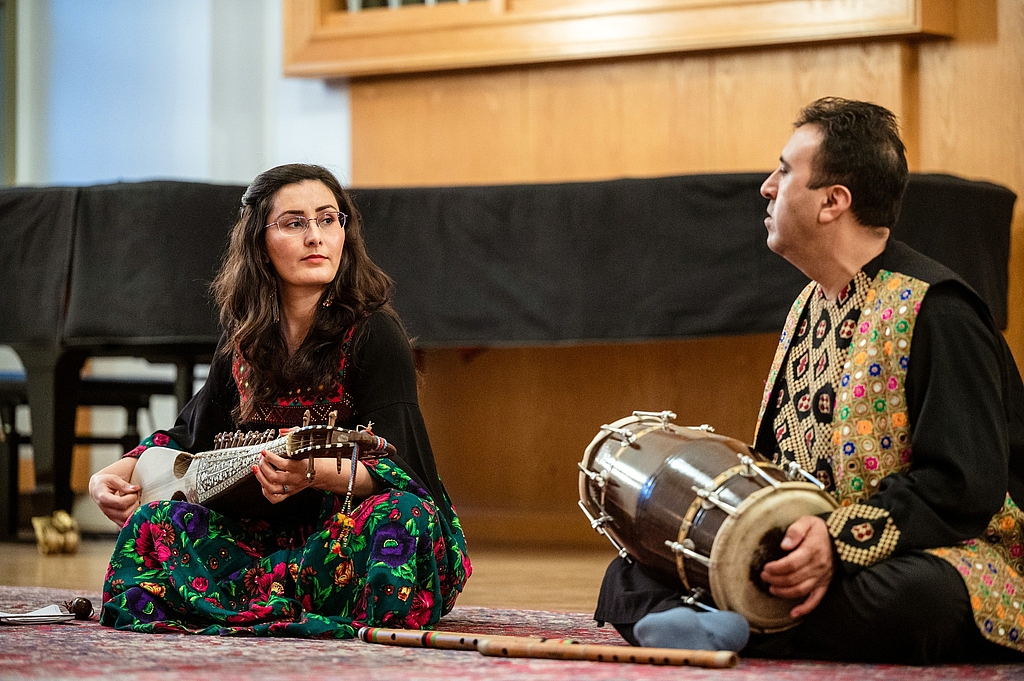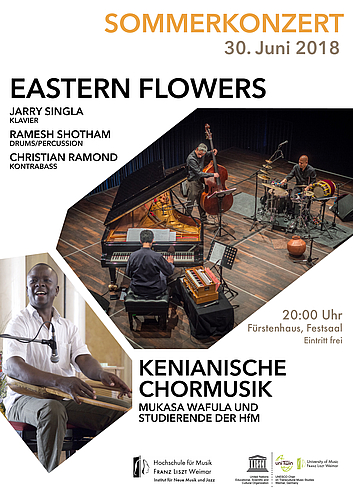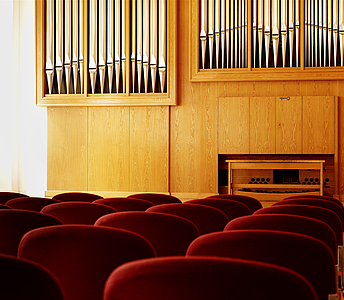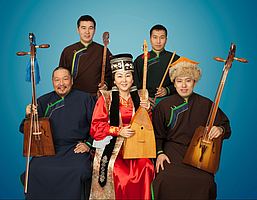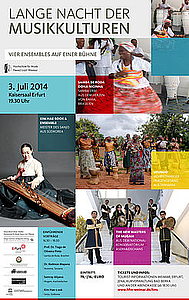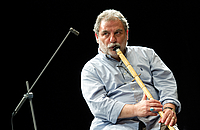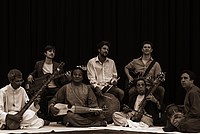World Wide Weimar on April 18, 2024
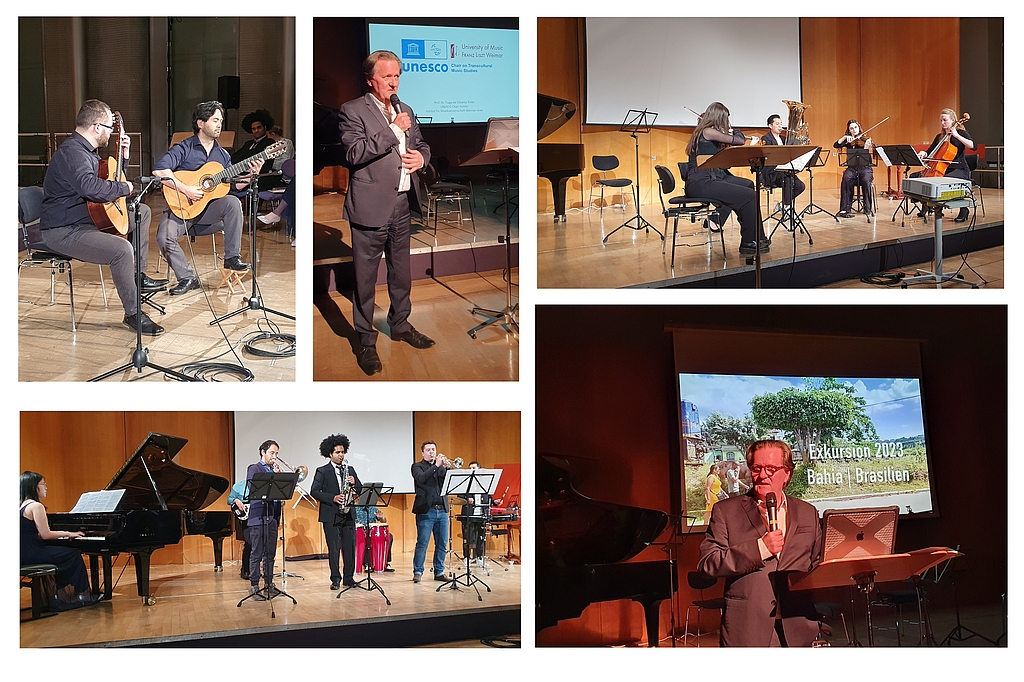
On Thursday, April 18, the concert event "World Wide Weimar" took place in the concert room of the Fürstenhaus at the Franz Liszt School of Music. Organized by the University's International Office in cooperation with the UNESCO Chair for Transcultural Music Studies, the concert demonstrated the great internationality of Weimar's music practice and music research. The program included an extensive transcultural concert experience as well as the ceremonial presentation of the STIBET scholarship certificates.
The evening was divided into three parts designed by current and former students, starting with "Intercultural Engagement". The evening began with Liszt's Liebestraum, arranged by saxophonist Yuniet Lombida Prieto and performed together with other ensemble members (Daniel Riedel - trumpet, Daniel Moreno - trombone, Fengyi Jin - piano, Francisco Lara Alvarez - electric bass, Güicho Luis Palacio Jaen - congas, Rommel Alexander Guasumba - timbales). The audience was welcomed by the Vice President for Digitalization and Internationalization, Dr. Jens Ewen.
This was followed by further - partly virtual - musical performances by international Weimar students (Leandro Falconi - violin, Gervasio Tarragona Valli - clarinet, Sergio Escalera Soria - piano, Safa Akyol - electric bass, Jacek Crobbs Rutkowski - beatbox, with the 3rd movement from: Trio in E flat by Aram Khachaturian, Arr. D'Takito // Rodrigo Aros Rodríguez - baroque violin, Gyula Szilágyi - harpsichord with the continuo in A major by Domenico Zipoli // Bohyun Kang - clarinet with "Piri" by Isang Yun) as well as a video interview of the scholarship holder Juan Sebastián Paez with the Internationalization Officer, Ly Tran. At the end of the first part of the event, the scholarship holders were presented with their certificates, followed by Fengyi Jin's interpretation of a Chinese folk song on the piano.
The second part of the evening was organized by Erasmus students of the HfM. Marie Cogels impressed with a solo on the bass flute to a piece by Peter Rose, as did the Efímero Quintet (María Lauer - violin, Mercedes Barné - violin, Lorena Sainz - viola, Nora Hensellek - violoncello, Rommel Alexander Guasumba - tuba) with "SoNotas for tuba and string quartet" by Francisco Loreto and finally Dante Fritzell on the flute, accompanied by Sophio Gigineishvili, with a "Swedish Fantasy for flute and piano" by Joachim Andersen.
The third part of the evening was organized by the UNESCO Chair for Transcultural Music Studies.
Chair holder Prof. Dr. Tiago de Oliveira Pinto spoke about transcultural influences in music, intangible cultural heritage and the work of the UNESCO Chair. A video with excerpts from the 2023 excursion to Bahia, Brazil, as part of the "Circulating Knowledges" project was also shown. This was followed by two pieces by João Pernambuco, interpreted by the guitarists Silvino Almeida (student in the Transcultural Music Studies profile) and Igor Seiji Moriya (former guitar student at the HfM Weimar). The evening was completed with three Brazilian pieces by the singer Anastasiia Doroshenko (vocal student at the HfM Weimar).
SYRIAB – Transcultural Music Session
On February 11 from 18:45 at "Mascha"
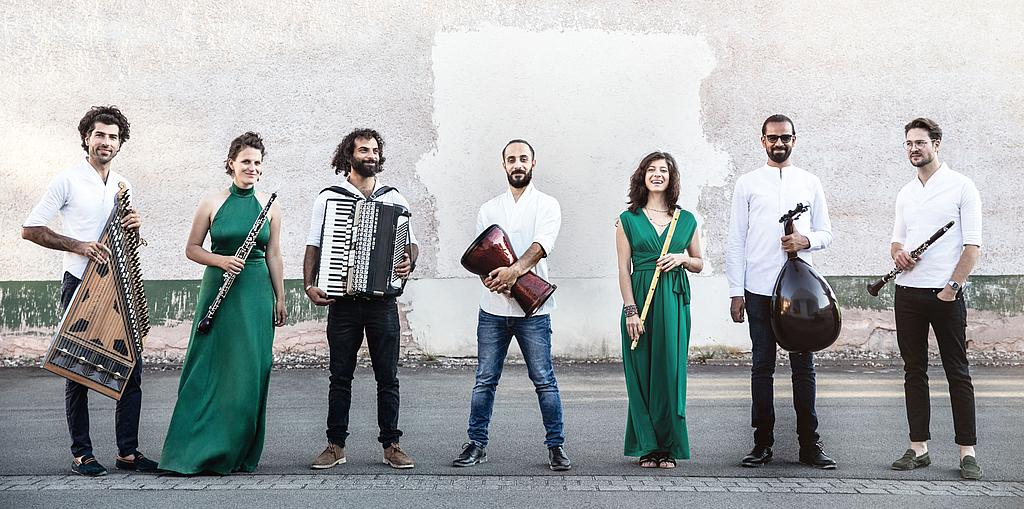
The SYRIAB ensemble, founded in 2009 by kanun player Ibrahim Bajo, was a Syrian orchestra that played various styles of Arabic music. Due to the war in Syria, the once 40 musicians are now spread all over the world. In Germany, SYRIAB has reunited in a smaller constellation and is now discovering Arabic and Mediterranean music with its innovative instrumentation of kanun, oud, nay, percussion, accordion, clarinet and oboe. The music is characterized by its own sound language and breaks new ground, also through cooperation with other artists, orchestras, ensembles and choirs. The musicians also give workshops. It is important to them to draw attention to the diversity of music and to promote transcultural music-making.
"...a break from everyday life with musicians who, when playing together, make you forget how different their backgrounds are. The rhythms, the melodies, their playing inspires for more."
Thüringer Landeszeitung
The SYRIAB is coming to Weimar on Sunday, February 11 from 18.45 at the "Mascha" cultural center (Schützengasse 2). Admission is free.
Schedule: Introductory workshop 18.45-19.15, concert 19.30-21.00, jam session with students from 21.00.
An event of the UNESCO Chair on Transcultural Music Studies at the Franz Liszt University of Music Weimar. With the kind support of the Erasmus+ program of the International Office and Miteinander durch Musik e.V.
Further information at www.syriab.de and www.hfm-weimar.de/tms
Konzert "Musik als lebendiges Kulturerbe"
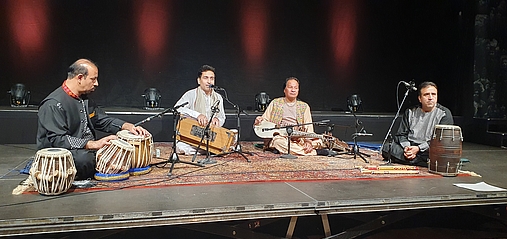
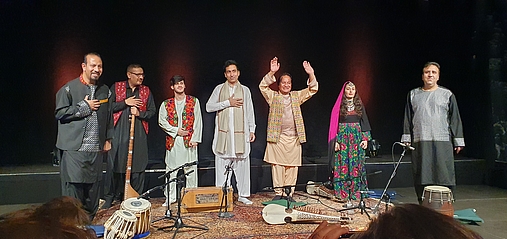
Am 27. Oktober 2023 veranstaltete der UNESCO-Lehrstuhl für Transcultural Music Studies und das International Office der HfM Franz Liszt Weimar ein Konzert mit einem afghanischen Ensemble im Rahmen der Tagung "Lebendige Musizierpraxis als immaterielles Kulturerbe“. Da der reiche Schatz der Musik Afghanistans momentan bedroht ist, erhalten im Exil lebende Musiker:innen ihr afghanisches Kulturerbe weiterhin am Leben und bringen ihre Musik in europäischen Sälen zum Klingen.
Die internationale Konferenz „Lebendige Musizierpraxis als immaterielle Kulturerbe“ (ICTMD 2023) war ein großer Erfolg und sehr inspirierend. Ebenso war das großartige Konzert „afghanische traditionelle Musik“ sowie im Anschluss die transcultural Jam Session ein besonderes Erlebnis.
Concert & symposium at the Rudolstadt Festival 2023
"Aban Ensemble" & "Sketches of Kuba"
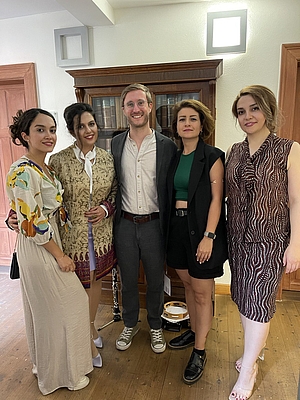
At this year's Rudolstadt Festival, 90,000 visitors came to make music and dance in the small Thuringian town and celebrated exuberantly at the largest folk-roots world music festival in Germany. The UNESCO Chair of the Institute of Musicology is represented every year and this year there were two concerts, a symposium and a workshop.
Prof. Pinto organized the international symposium "Sketches of Cuba" on the festival's country focus Cuba. The big names in Cuban musicology and Cuban cultural management spoke about transculturation, rumba & clave and the opportunities and limitations of the music industry.
Our research assistant played with her Iranian ABAN ensemble, first in the Stadttheater and then in the Stadtkirche. There was great interest and around 400 people listened to the fusion of jazz, film music, electro-acoustic music and traditional rhythms and melodies from different regions of Iran.
Between the concerts, the four musicians came together for a workshop and answered questions from the curious audience about the current situation of women and artists in Iran. The workshop "Woman. Life. Freedom." was moderated by our research assistant Sean Prieske.
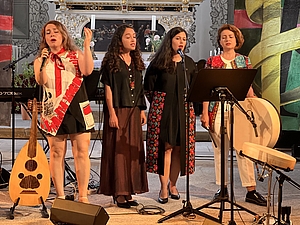
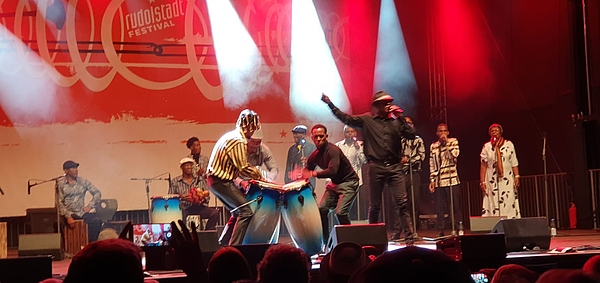
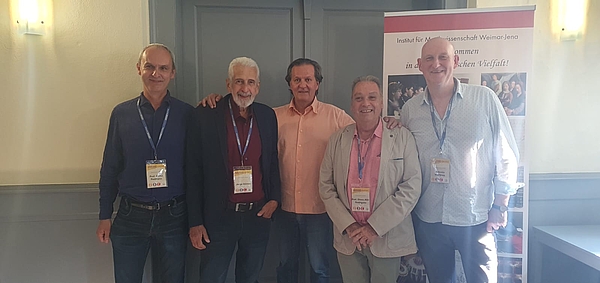
Safar-Konzert in der Philharmonie Luxemburg
"Traditional music from Afghanistan"
Im Jahr 2012 entstand in Zusammenarbeit mit der HfM das Projekt "Safar" und markierte einen großen Fortschritt in der Wiederbelebung afghanischen Musikerbes. Auch nach der erneuten Machtübernahme der Taliban in Afghanistan bleiben die Meistermusiker des exilierten ANIM (Afghanistan National Institute Of Music) aktiv und kooperieren über ganz Europa hinweg. Die Anstrengungen afghanische Musikerinnen und Musiker zu unterstützen, ihr Erbe aufrechtzuerhalten und ihre Kenntnisse weiterzugeben haben sich gelohnt und so konnte man am Mittwoch, den 24.05., ein großartiges Konzert in der Philharmonie Luxemburg hören.
Es ist schön zu sehen, dass Kulturinstitutionen die Aufgabe, ihre Podien zu Redetribünen umzufunktionieren, ernst nehmen und einem von der Auslöschung bedrohten Repertoire Gehör verschaffen. "Safar" setzt auch ein zukunftsweisendes Signal in der Besetzung: Mit Fazila Zamer, eine neue Studentin der HfM, wirkt unter den Männern auch eine ehemalige ANIM-Schülerin und jetzige Musiklehrerin als Solistin an der Rubab mit.
Safar Ensemble
Ustad Ghulam Hussain - rubab
Waheedullah Saghar - harmonium
Ustad Feraydoon Meyazada - tabla
Ustad Rasul Azizi - dotâr
Ustad Abdul Latif Sharifi - dohol, tula
Fazila Zamer - rubab
Ahmad Shekib Osmani - harmonium
Ustad Mohammad Murad Sarkhosh - gheychak
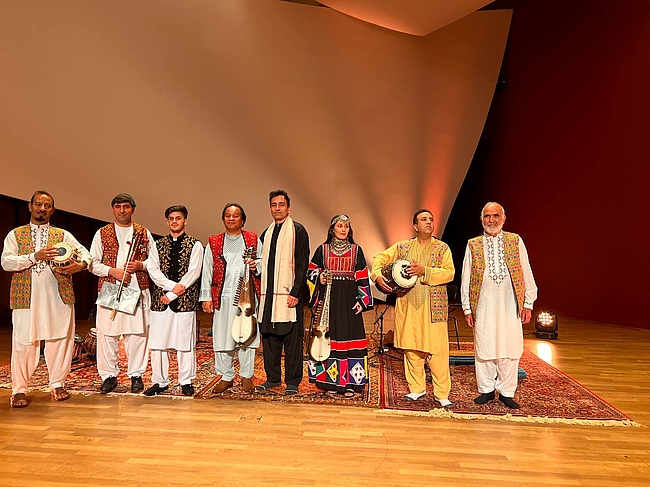
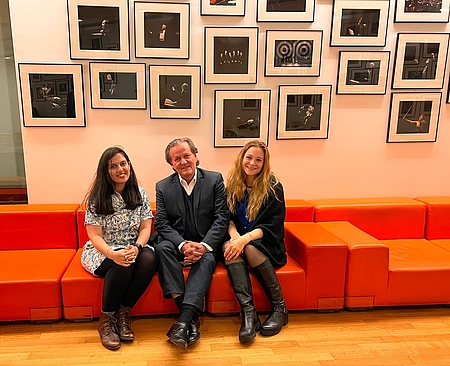
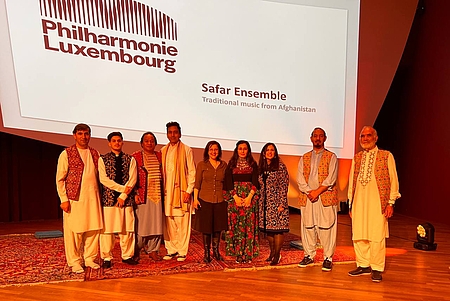
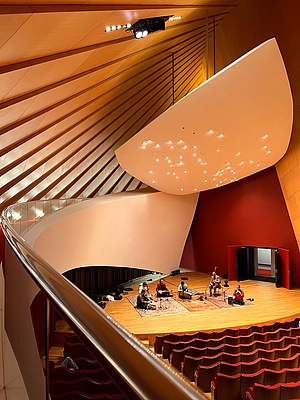
Honorary Doctorate for Evgeny Kissin
How humanistic must music be? About music in times of war
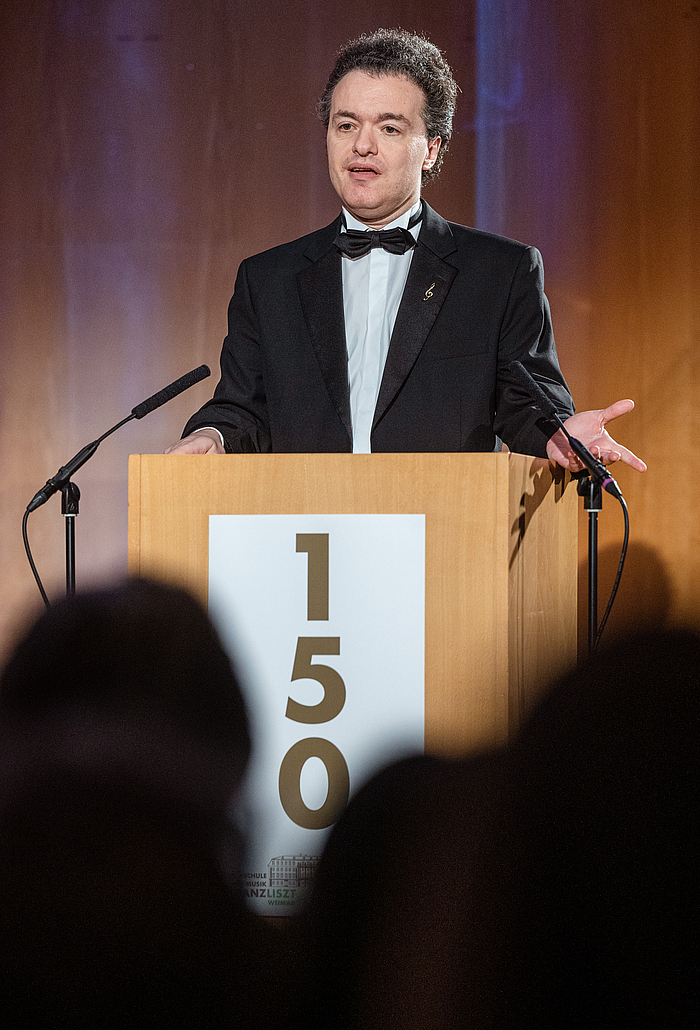
On 22 October 2022, the 211th birthday of Franz Liszt, the pianist Evgeny Kissin received an honorary doctorate from the Weimar-Jena Musicology Department of the Franz Liszt School of Music in Weimar. The honorary doctorate was awarded to him for his outstanding and exceptional artistic pianistic achievements, especially in connection with his services to the communication of the pianistic works of Franz Liszt. On the occasion of the 150th anniversary of the Franz Liszt School of Music, it was only natural to honour an international pianist. The honour was initiated by Prof. Dr. Tiago de Oliveira Pinto, who also gave one of the three laudations.
Evgeny Kissin's literary activities in Yiddish were acknowledged as well as his efforts to promote "humanism in the world" through his musical work. This "musical humanism" encourages reflection on the ethical role of music, especially in our time when the old world orders are threatening to disintegrate.
Two compositions by Kissin were performed, his String Quartet op. 3, played by the Weimar "Gropius Quartet" (three of the members are professors at the university) and his new op. 6, a piano trio, played by professors Friedemann Eichhorn, violin, and Wolfang Emanmike uel Schmidt, cello. Kissin himself sat at the piano.
Evgeny Kissin's Piano Trio op. 6 was completed in August 2022 and was written in response to the invasion of Ukraine. In the first movement, the composition refers to war and destruction. It is thus also a plea against brutality and inhumanity. In his speech, Kissin denounced the Russian head of state three times and added the Hebrew exclamation: Yimakh shmo - "May his name be cursed!", which is tantamount to a damnatio memoriae, the erasure of all memory of this person. Ultimately, Kissin's composition raises the question of whether the war was even necessary to create such compelling music.
Click here to read the detailed musicological analysis in the full article by Prof. Tiago de Oliveira Pinto Version.
Click here to read the laudation by Prof. Tiago de Oliveira Pinto.
Konzert an der HSLU Luzern
Gesprächskonzert mit traditioneller Musik aus Afghanistan
Die Meistermusiker Ustad Ghulam Hussain (Rubab) und Mirweis Neda (Tabla) spielten im Rahmen des Musikfestivals „Szenenwechsel“ an der HSLU Luzern mit dem Musikwissenschaftler Peter Lell traditionelle Musik aus Afghanistan. Moderiert wurde das Gesprächskonzert von Prof. Dr. Helena Simonett und Mitra Behpoori vom TMS Lehrstuhl der HfM FRANZ LISZT. Es ging um musikalische Vielstimmigkeit und Aneignung und wie das global vielfältige musikalische Erbe unter Berücksichtigung von machtsensiblen Ansätzen gepflegt werden kann.
Weitere Infos und Bilder gibt es auf unserer Facebookseite.
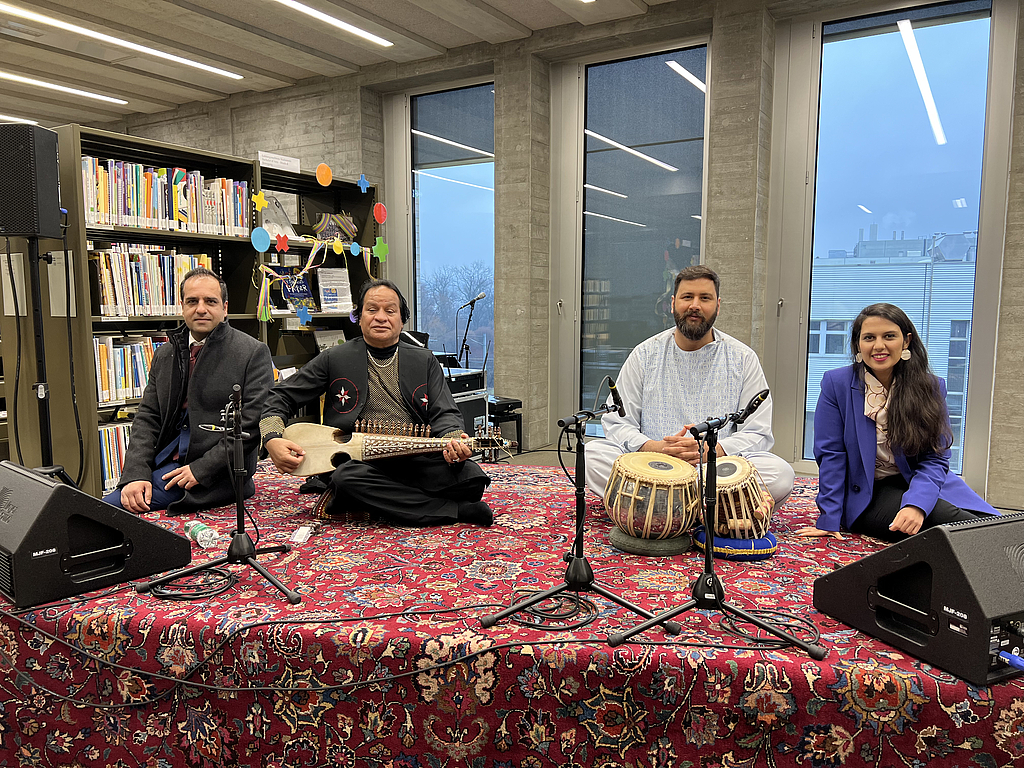
Transcultural Music Session
Othman El Kheloufi & Band
Auf Einladung des @hfm_weimar_international Office und des TMS-Lehrstuhls gab der marokkanische Komponist, Sänger, Saxophonist, Regisseur und vielseitige Künstler Othman El Khleoufi und sein Quartett ein Konzert bei den Transcultural Music Sessions im Mascha.
Zuvor hatte Othman Elkheloufi in einem Workshop über Chaâbi gesprochen und die Schüler in marokkanische Rhythmen eingeführt. Der Musikwissenschaftler Eric Petzold begleitet El Kheloufi und dessen Band auf deren Europa-Tournee und sprach über ihr Projekt MAZMOUT. Das Format des Gesprächskonzerts öffnete den Raum für Publikumsfragen und musikalische Auseinandersetzungen mit Musiktraditionen aus dem Maghreb.
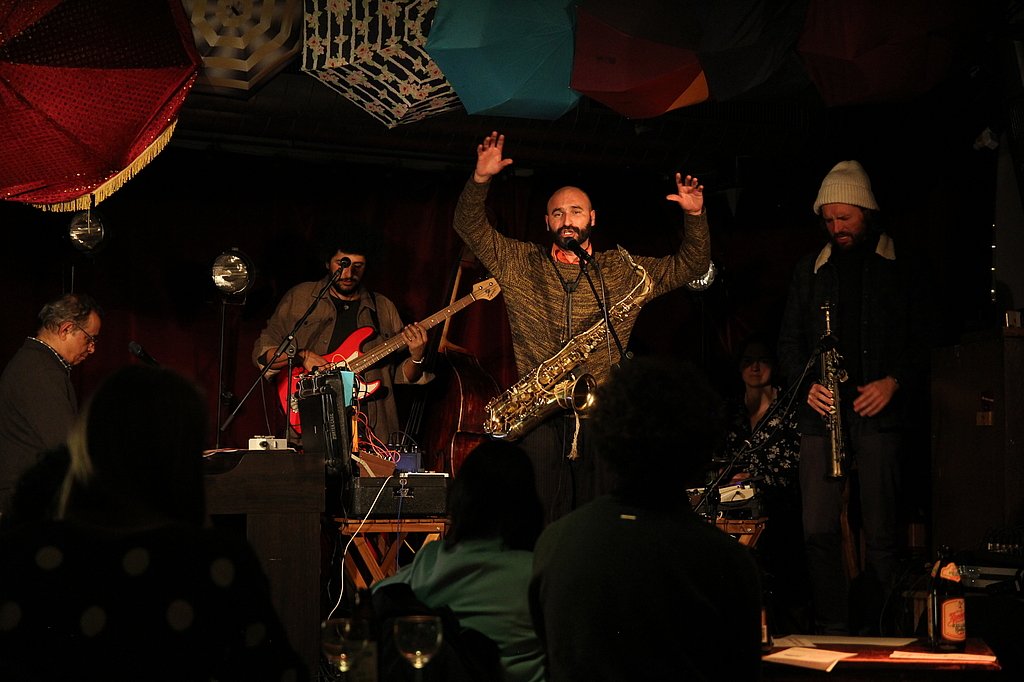
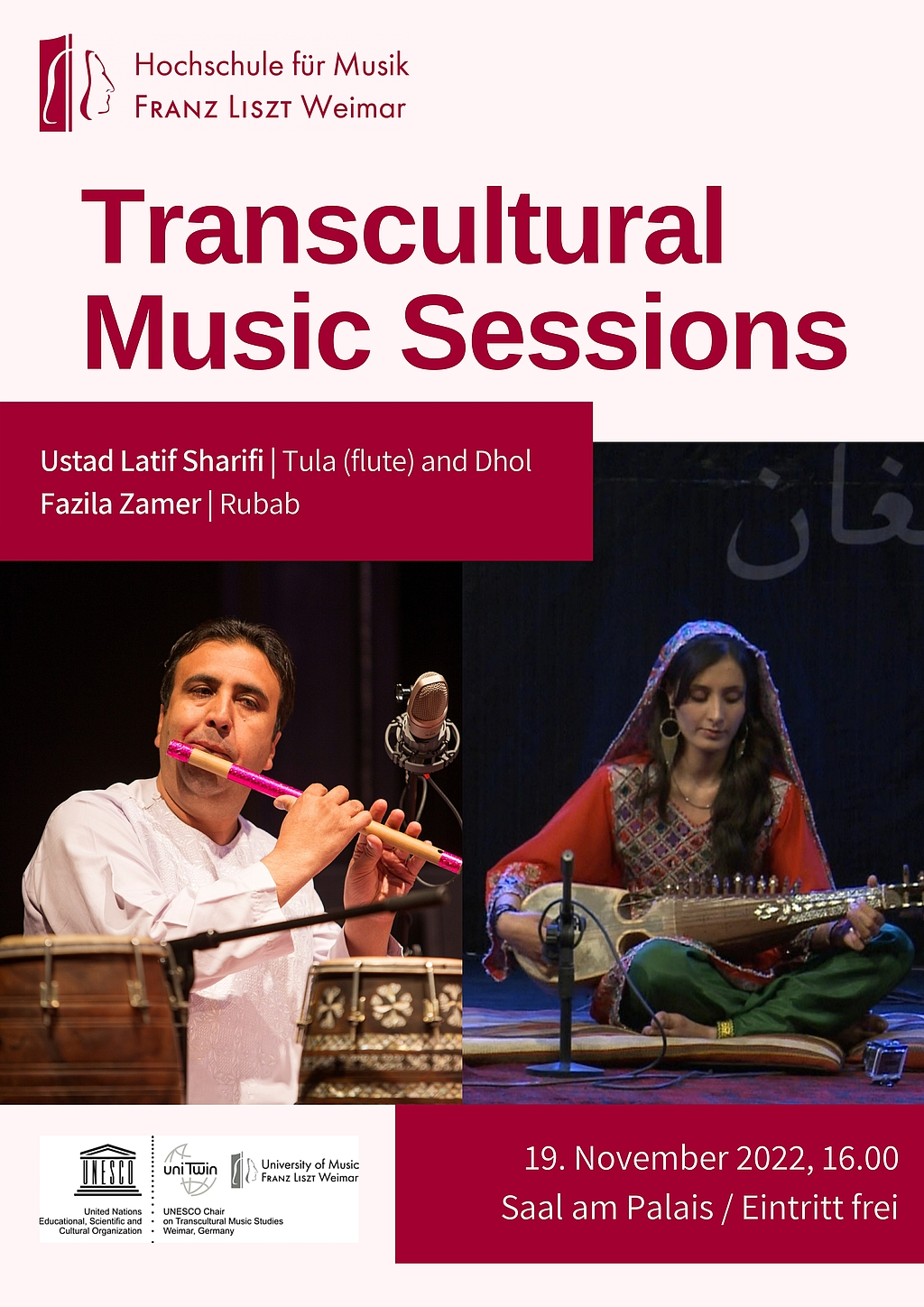
Transcultural Music Session
Ustad Latif Sharifi & Fazila Zamer
Gemeinsam mit @hfm_weimar_international präsentierte der Lehrstuhl für Transcultural Music Studies afghanisches Musikerbe im Saal am Palais. Zum Auftakt der neuen Reihe "Transcultural Music Sessions" gaben Fazila Zamer und Ustad Latif Sharifi ein Konzert auf traditionellen afghanischen Instrumenten (Rubab, Dhol und Tula). Im Anschluss gab es ein angeregtes Gespräch über die afghanische Musikkultur, moderiert von Mitra Behpoori. Es wurde das Leben der Musiker:innen im Exil sowie in Afghanistan beleuchtet und über aktuelle Verbote und Möglichkeiten gesprochen. Ein zentrales Thema war die Flucht aus Afghanistan und die damit zusammenhängenden Schwierigkeiten, wie beispielsweise die Mitnahme des Instruments. Zudem berichtete Fazila Zamer von ihrer Erfahrung als afghanische Musiklehrerin in Kabul und sprach über musikalische Lehrformate. Durch die Erzählungen bekam das Publikum einen Eindruck vom Ernst der Lage der Musiker:innen in Afghanistan, welche dort von der eigenen Regierung marginalisiert werden.
[Translate to English:] Verleihung der Goethe Medaille 2022
"Notturno" & "Transtemporal Cultures"
Am 28. August, dem Geburtstag Johann Wolfgang von Goethes, ehrte das Goethe-Institut in Weimar vier Persönlichkeiten, die sich in besonderer Weise um den internationalen Kulturaustausch verdient gemacht haben: der bildende Künstler Mohamed Abla aus Ägypten, die Historikerin Tali Nates aus Südafrika sowie Nimi Ravindran und Shiva Pathak vom Sandbox Collective aus Indien.
Das Ehrenzeichen der Bundesrepublik Deutschland wurde von der Präsidentin des Goethe-Instituts Carola Lentz in Anwesenheit von Außenministerin Annalena Baerbock verliehen. Prof. Pinto kuratierte bereits zum zehnten Mal das Musikprogramm. Aufgeführt wurde Musik von Christoph Baumgarten und Bernhard Bleibinger.
Link zum Videomitschnitt
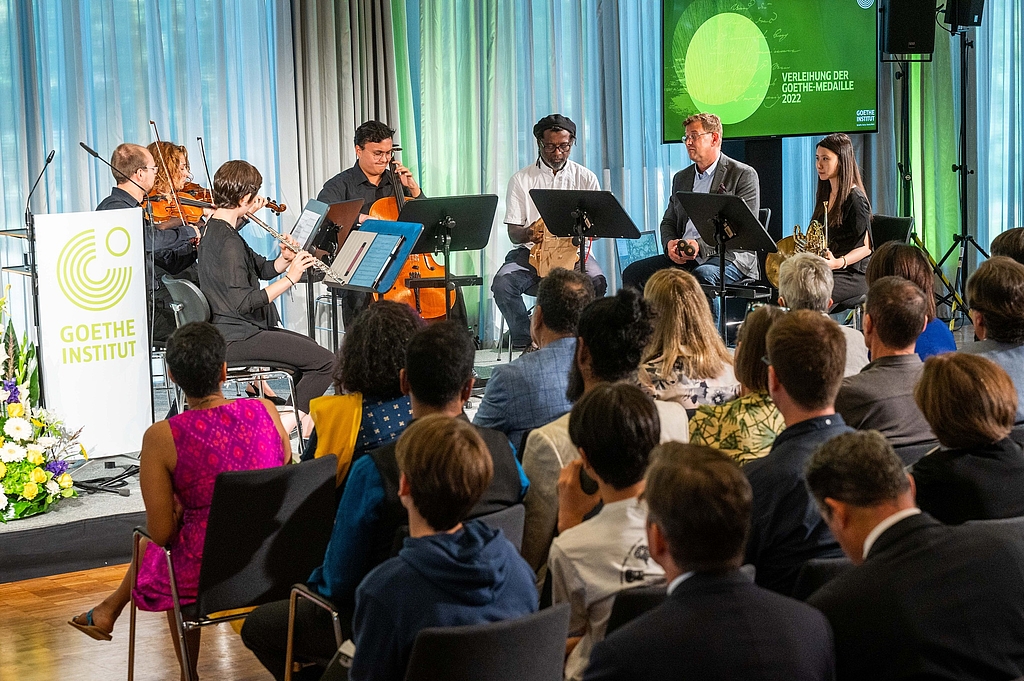
[Translate to English:] Meistermusiker aus Kabul | Rudolstadt Festival 2022
Podiumsdiskussion & Konzert
Beim diesjährigen Rudolstadt Festival kamen die Besucher:innen in den Genuss, Meistermusiker aus Kabul zu hören. Organisiert und moderiert von Prof. Dr. Tiago de Oliveira Pinto.
In Fortsetzung der langjährigen Zusammenarbeit mit den Musikern des Afghanistan National Institute of Music (ANIM) lud der Lehrstuhl für Transcultutsal Music Studies die Meistermusiker für ein Konzert in die schöne Stadtkirche in Rudolstadt eingeladen.
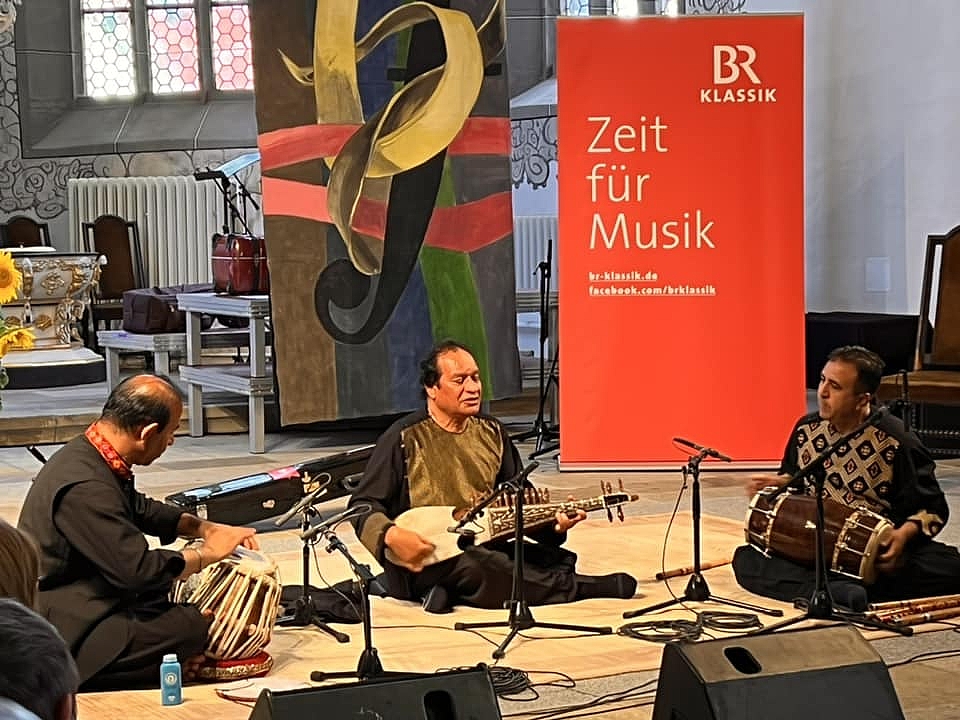
[Translate to English:] Tropicaliszt
Multimediales Projekt im Zeiss-Planetarium | 11. Mai 2022
Er war ein Klaviervirtuose, Komponist und Improvisator aus den Tropen: Louis Moreau Gottschalk (1829-1869). In New Orleans geboren, studierte Gottschalk in Paris, wo er u.a. Georges Bizet und Camille Saint-Saëns kennen lernte. Zurück in Louisiana, startete er von dort eine pianistische Virtuosenkarriere, die ihn quer durchs Land, in die Karibik und nach Südamerika führte. Dieser „tropikale Liszt“ reiste mit zwei Klavieren, einem Klavierstimmer und seinem Impresario in Sonderzügen. Er wurde in Salons, in Theater- und Fürstenhäusern, auf offenen Plätzen und an Strandpromenaden gefeiert.Die Parallelen mit dem Leben seines Zeitgenossen Franz Liszt sind unverkennbar.
Diese musikalische Weltläufigkeit wurde im 150. Jubiläumjahr der Hochschule für Musik FRANZ LISZT Weimar mit Tropicaliszt gewürdigt. Dazu trafen sich Studierende der Institute für Klavier und Musikwissenschaft sowie Medienkünstler*innen der Bauhaus-Universität Weimar zu einem multimedialen Projekt, bei dem Musik von Gottschalk und Liszt in einer 360-Grad-Projektion visualisiert wurde.
Eröffnung des 16. FullDome Festivals im Zeiss-Planetarium Jena
Mitwirkende:
Studierende der Institute für Klavier und Musikwissenschaft Weimar-Jena der Hochschule für Musik FRANZ LISZT Weimar Medienkünstler*innen der Bauhaus-Universität Weimar, Immersive Medien
Veranstalter: FullDome Festival
Kooperationspartner: Hochschule für Musik FRANZ LISZT Weimar und Bauhaus Universität Weimar
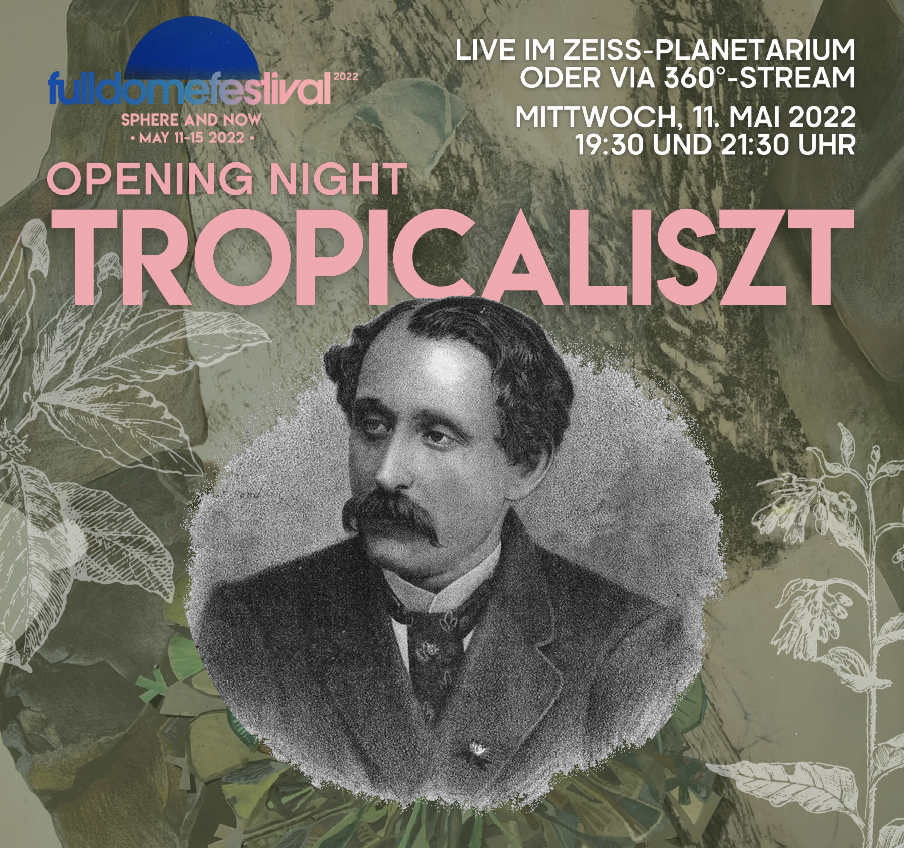
Sounds of the world – The worlds of sounds
10 Years TMS
Recording of the concert "Sounds of the world – The worlds of sounds" on the occasion of the tenth anniversary of the UNESCO Chair on Transcultural Music Studies (TMS) on November 29th 2019 | Weimar, University of Music FRANZ LISZT Weimar, Festsaal Fürstenhaus
:::Concert programme::: (in German)
Ivan Vilela
The first part of the concert focuses on the Brazilian artist Ivan Vilela. He is one of the most important virtuosos of the ten-stringed guitar instrument "Viola Caipira", has researched its history and further developed the playing techniques.
Sound Affinities Ensemble
In the second part of the concert, the international four-member "Sound Affinities Ensemble" will perform. It was founded on the initiative of our UNESCO Chair and is led by Mehdi Aminian (Iran), who plays and sings on the long-necked flute "Ney" and the long-necked lute "Setar". The ensemble also includes Emmanuel Hovhannisyan (Armenia) on the woodwind instrument "Duduk", Nora Thiele (Germany) on the frame drum and other instruments, and Yesun-Erdene Bat (Mongolia) on the horse-head fiddle "Morin Khuur" and as an over- and undertone singer.
Global Contexts
Prof. Dr. Tiago de Oliveira Pinto reports in the LISZT Magazine on "Cultural Encounters: Ten years of Transcultural Music Studies at the Department of Musicology Weimar-Jena".
LISZT Magazine (N° 17, April 2020), article "Global Contexts", p. 50–53
:::To the article::: (in German)
